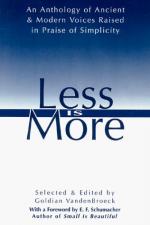
|
| Name: _________________________ | Period: ___________________ |
This test consists of 5 multiple choice questions, 5 short answer questions, and 10 short essay questions.
Multiple Choice Questions
1. Saint Bernard says that he does not notice the _________ of his method of getting around, according to the book.
(a) Effectiveness.
(b) Power.
(c) Magnificence.
(d) Truth.
2. Each cell in a _______ is built at an angle which provides the most strength but requires the least amount of materials to hold it up.
(a) Beehive.
(b) Leaf.
(c) Pod.
(d) Home.
3. To Honore de Balzac, the artist is the one who has always kept the true _______ between riches and poverty, according to the book.
(a) Volume.
(b) Understanding.
(c) Space.
(d) Balance.
4. ________ speaks to the reader of the inherent fear of worry of losing the riches one has, according to the book.
(a) Seneca.
(b) Gandhi.
(c) Milton.
(d) Morton.
5. Saint _______ notes that ignoring one's wealth is much like removing it from one's life entirely, according to the book.
(a) Roman.
(b) Bernard.
(c) Teresa.
(d) Assisi.
Short Answer Questions
1. The _______ is always easier when one travels lighter, according to the book in this section, and according to Felix.
2. The power of the _______ is unlimited and is the tool that changes culture, according to the book.
3. Artists and the creative community are said to be the only ones who enjoy an existence that is truly ________, according to the book.
4. Marcus Aurelius writes how __________ is a life-long experience, according to his writing in this section of the book.
5. The need to develop __________ is essential in providing energy for the world's population, according to the book.
Short Essay Questions
1. What does Huxley have to say about the West and what it is doing to the world as it grows?
2. What does Sir Francis Bacon have to say about the baggage that one carries in their life?
3. What does this section say that children are taught at a young age, which might explain modern society?
4. What does Regamey say the destitute in a society is a sign for?
5. How do the bees build their own homes, which is clearly different from the way that humans build their homes?
6. What does the Ford Foundation report have to say about the idea of overpopulation?
7. What does Saint Bernard have to say about the idea of having many possessions?
8. What does this section define the idea of the simple life, according to the book?
9. What has the artist always been able to do, according to Honore de Balzac?
10. What does this section say is a part of human nature, and Gandhi says one must have faith in the future?
|
This section contains 644 words (approx. 3 pages at 300 words per page) |

|




